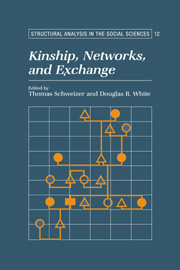Book contents
- Frontmatter
- Contents
- Preface
- List of contributors
- 1 Revitalizing the Study of Kinship and Exchange with Network Approaches
- I Representing Kinship Dynamics, Material Flow, and Economic Cooperation
- II Individual Embeddedness and the Larger Structure of Kinship and Exchange Networks
- III Marriage, Exchange, and Alliance: Reconsidering Bridewealth and Dowry
- 9 Wealth Transfers Occasioned by Marriage: A Comparative Reconsideration
- 10 Prestations and Progeny: The Consolidation of Well-Being among the Bakkarwal of Jammu and Kashmir (Western Himalayas)
- 11 “We Don't Sell Our Daughters”: A Report on Money and Marriage Exchange in the Township of Larantuka (Flores, E. Indonesia)
- IV Emergence, Development, and Transformation of Kin-Based Exchange Systems
- Index
10 - Prestations and Progeny: The Consolidation of Well-Being among the Bakkarwal of Jammu and Kashmir (Western Himalayas)
Published online by Cambridge University Press: 05 November 2011
- Frontmatter
- Contents
- Preface
- List of contributors
- 1 Revitalizing the Study of Kinship and Exchange with Network Approaches
- I Representing Kinship Dynamics, Material Flow, and Economic Cooperation
- II Individual Embeddedness and the Larger Structure of Kinship and Exchange Networks
- III Marriage, Exchange, and Alliance: Reconsidering Bridewealth and Dowry
- 9 Wealth Transfers Occasioned by Marriage: A Comparative Reconsideration
- 10 Prestations and Progeny: The Consolidation of Well-Being among the Bakkarwal of Jammu and Kashmir (Western Himalayas)
- 11 “We Don't Sell Our Daughters”: A Report on Money and Marriage Exchange in the Township of Larantuka (Flores, E. Indonesia)
- IV Emergence, Development, and Transformation of Kin-Based Exchange Systems
- Index
Summary
The relationship between kinship and exchange is perhaps most obvious in the context of marriage. In most societies marital alliances entail the exchange of goods and/or services, which is often also a prerequisite for the exchange of rights in children. In this paper I present data on exchange in the form of marriage prestations among the Bakkarwal of Jammu and Kashmir, who are located in the western Himalayas (Khatana 1992; Rao 1992a; Rao and Casimir 1985; Rao 1997). This increasingly stratified, patrilineal, Islamic community of roughly 12,000 nomadic pastoralists consists of 39 patrilineally organized, preferentially endogamous units, known as zat or khel (Rao 1988a); these units in their turn are composed of patrilineal groupings of families whose ancestors migrated into their present areas around the turn of the century from the two valleys of Allai and Kunhar in present day Pakistan (Rao 1988a,b, 1990). The taxons zat and khel are semantic keys to the historical identity of the entire Bakkarwal community. Zat probably derives from the same Indo-Iranian root as the word jati of the Hindu varna-jati system. Khel denotes various units of social organization in areas of Pashtun influence, and it is transcribed in neighboring contexts as khel (or xēl). Although taxonomically different, zat and khel among the Bakkarwal are today organically and functionally undifferentiable, but they indicate different origins. Thirty-six zat form one subdivision; that of the Kunhari.
- Type
- Chapter
- Information
- Kinship, Networks, and Exchange , pp. 210 - 233Publisher: Cambridge University PressPrint publication year: 1998
- 3
- Cited by

